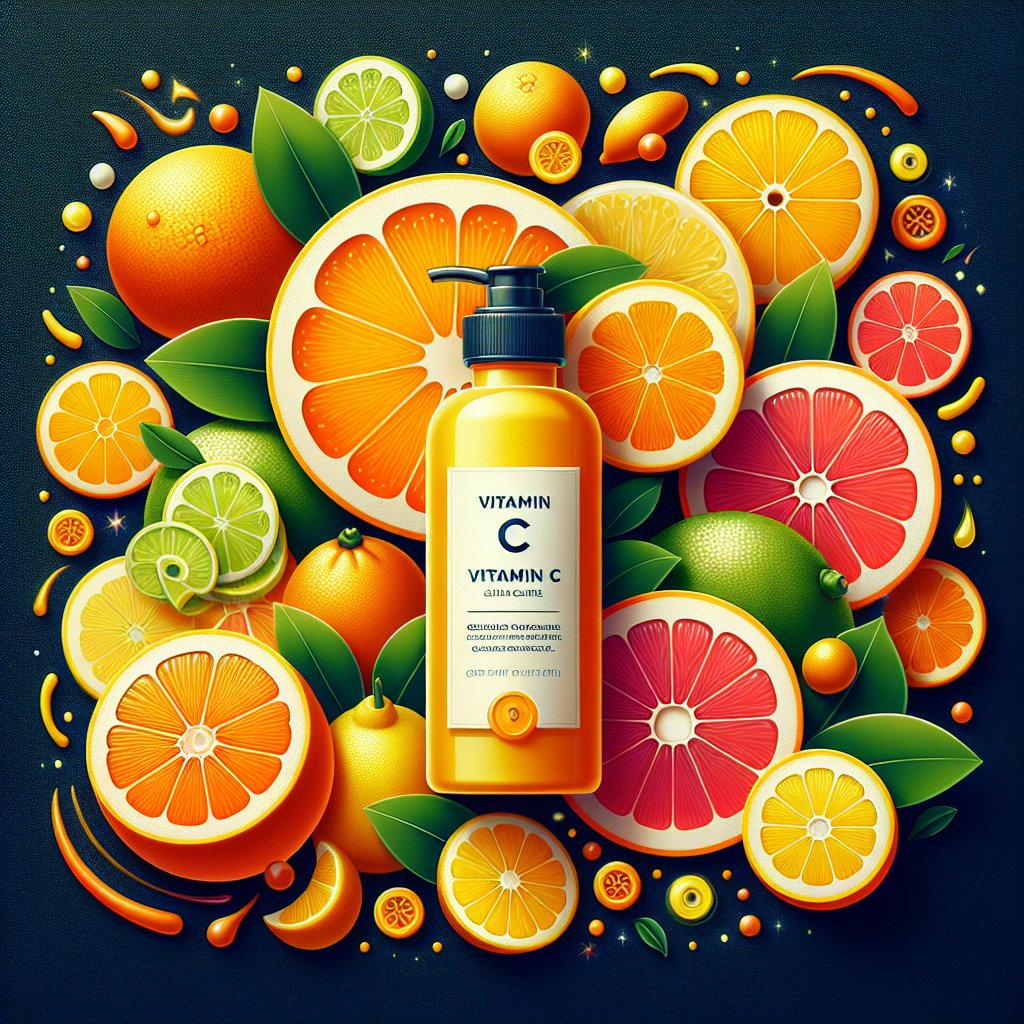Bid Farewell to Vitamin C Skin Irritation with These Effective Home Remedies!
Unlocking the Power of Vitamin C for Healthy Skin
When it comes to radiant and youthful-looking skin, we often turn to a variety of skincare products and beauty treatments. However, there’s one essential nutrient that plays a fundamental role in promoting skin health: vitamin C. This powerhouse ingredient isn’t just beneficial when ingested but also incredibly valuable when applied topically to the skin. In this article, we’ll delve into the importance of vitamin C for skin health and explore the potential benefits it offers, all while sharing effective home remedies to bid farewell to vitamin C skin irritation.
The Importance of Vitamin C for Skin Health
Vitamin C, also known as ascorbic acid, is a potent antioxidant that is crucial for the growth, development, and repair of skin tissues. Our bodies rely on vitamin C to produce collagen, a protein that provides structure and elasticity to the skin. As we age, the natural production of collagen diminishes, leading to the formation of fine lines, wrinkles, and sagging skin. By incorporating vitamin C into our skincare regimen, we can support collagen production and maintain a firm and youthful complexion.
Moreover, vitamin C shields the skin from free radical damage caused by environmental stressors such as pollution and UV rays. This antioxidant function helps combat the signs of aging and contributes to a more even skin tone. Additionally, vitamin C assists in brightening the skin and reducing the appearance of dark spots and hyperpigmentation, promoting a radiant and glowing complexion.
Potential Benefits of Vitamin C for the Skin
Research has shown that the topical application of vitamin C can offer an array of benefits for skin health. Apart from its role in collagen synthesis, vitamin C exhibits anti-inflammatory properties, making it effective in soothing irritated and sensitive skin. Furthermore, it aids in strengthening the skin’s barrier function, enhancing its resilience against external aggressors and minimizing the risk of irritation.
One of the most sought-after benefits of vitamin C is its ability to counteract the effects of sun damage. Studies have indicated that regular use of vitamin C can attenuate UV-induced skin discoloration and provide mild photoprotection. This doesn’t replace the need for sunscreen, but it complements sun protection measures, making it a valuable addition to a comprehensive skincare routine.
Now that we’ve unraveled the importance of vitamin C for skin health and explored its potential benefits, it’s time to address the issue of vitamin C skin irritation. While this incredible nutrient offers numerous advantages, some individuals may experience skin sensitivity or irritation when using vitamin C-infused products. In the next sections, we’ll delve into effective home remedies to alleviate vitamin C skin irritation, allowing everyone to harness the remarkable benefits of vitamin C without the worry of adverse skin reactions.

Understanding Vitamin C Skin Irritation
If you’ve ever experienced skin irritation after using a vitamin C serum, you’re not alone. While vitamin C is widely celebrated for its numerous skincare benefits, it can also cause irritation in some individuals.
So, what are the common causes and symptoms of vitamin C skin irritation?
Common Causes:
The most common cause of vitamin C skin irritation is the pH level of the product. Research has shown that vitamin C works best at a pH between 2 and 3. At higher pH levels, it can become unstable and potentially cause irritation.
Another factor is the concentration of vitamin C in the product. Higher concentrations of vitamin C can sometimes be too potent for sensitive skin, leading to redness and irritation.
Symptoms:
Symptoms of vitamin C skin irritation can manifest as redness, itching, burning, or even a stinging sensation on the skin. Some individuals may also experience dryness or peeling, especially if they have pre-existing sensitive skin.
If you’re experiencing any of these symptoms after using a vitamin C product, it’s essential to discontinue use and seek alternative solutions to address the irritation.
Tips on Preventing Vitamin C Skin Irritation
If you’ve ever experienced skin irritation from using Vitamin C products, you’re not alone. While Vitamin C is renowned for its skin-brightening and anti-aging properties, it can sometimes cause irritation, especially for those with sensitive skin. But fear not, there are several effective strategies you can employ to prevent Vitamin C skin irritation.
Patch Testing
Before applying any new Vitamin C product to your face, it’s crucial to perform a patch test. This involves applying a small amount of the product to a discreet area, such as the inside of your wrist or behind your ear, and monitoring it for 24 hours for any adverse reactions. This simple step can help you identify potential irritations before applying the product to your entire face.
Proper Application Techniques
When it comes to Vitamin C products, less is often more. A few drops of a Vitamin C serum or a pea-sized amount of Vitamin C cream is generally sufficient for the entire face. Excessive use of Vitamin C products can overwhelm the skin and lead to irritation. Additionally, ensure that your skin is clean and dry before applying Vitamin C products to maximize their effectiveness and minimize the risk of irritation.
Another tip is to avoid layering Vitamin C with other potent active ingredients, especially those known to cause skin sensitivity, such as retinoids or exfoliating acids. Instead, it’s best to use Vitamin C in the morning and reserve other actives for your nighttime skincare routine.
By implementing these simple yet effective strategies, you can bid farewell to Vitamin C skin irritation and harness the numerous benefits this powerful ingredient has to offer your skin.

Treating Vitamin C Skin Irritation at Home
So you’ve recently jumped on the vitamin C skincare bandwagon, hoping to achieve that coveted radiant complexion. But instead, you’re left with red, itchy, irritated skin – not fun! The good news is that there are gentle remedies and practices you can use right at home to alleviate vitamin C skin irritation.
Understanding the Irritation
First things first, let’s understand why vitamin C can sometimes cause skin irritation. Research shows that the low pH of vitamin C serums, typically below 3.5, can lead to skin irritation, especially in individuals with sensitive skin (Source: Dermatitis Journal). This pH level is necessary for the stability and efficacy of vitamin C but can be harsh for some skin types.
Gentle Skincare Practices
When experiencing vitamin C skin irritation, it’s essential to simplify your skincare routine and use gentle products. Opt for a mild, fragrance-free cleanser and a soothing moisturizer to help repair the skin barrier. Look for products with ceramides, hyaluronic acid, and niacinamide, which are known for their calming and hydrating properties (Source: Clinical, Cosmetic, and Investigational Dermatology).
Home Remedies
There are several home remedies you can try to alleviate vitamin C skin irritation. A cool compress using a soft cloth soaked in cold green tea can help reduce inflammation and soothe the skin. Additionally, applying a thin layer of aloe vera gel, known for its healing properties, can provide relief from redness and discomfort (Source: Indian Journal of Dermatology).
Another effective home remedy is oatmeal. You can create a gentle oatmeal mask by mixing colloidal oatmeal with water and applying it to the irritated skin for 10-15 minutes. Oatmeal is a natural anti-inflammatory ingredient and can help calm the skin (Source: Journal of Drugs in Dermatology).
Remember, while trying these home remedies and skincare practices, it’s important to patch-test new ingredients and products on a small area of your skin to ensure that they don’t cause further irritation.
By incorporating these gentle skincare practices and home remedies into your routine, you can effectively alleviate vitamin C skin irritation and get back to enjoying the benefits of this powerful antioxidant for your skin!
The Best Way to Treat Vitamin C Skin Irritation
While many people enjoy the benefits of using Vitamin C in their skincare routine, it’s essential to be mindful of potential skin irritation that can occur, especially in severe cases. If you’ve experienced significant Vitamin C skin irritation, seeking professional advice from a dermatologist is crucial.
Professional dermatologists have the expertise to diagnose and treat various skin conditions, including Vitamin C skin irritation. They can provide personalized recommendations tailored to your skin type and the severity of the irritation.
When you consult a dermatologist for Vitamin C skin irritation, they will conduct a thorough assessment of your skin, taking into account factors such as your medical history, existing skincare routine, and any allergies. This comprehensive evaluation enables them to determine the most suitable course of treatment to alleviate the irritation effectively.
The Benefits of Professional Advice
It’s important to understand that severe cases of Vitamin C skin irritation may require professional intervention to prevent further damage and promote healing. Dermatologists can offer targeted treatment options, such as prescription-strength creams or ointments, to soothe the skin and reduce inflammation.
Furthermore, by seeking professional advice, you can gain valuable insights into preventive measures and alternative skincare ingredients that are better suited to your skin’s needs. This tailored approach can help you avoid future episodes of Vitamin C skin irritation while still reaping the benefits of effective skincare.
Remember, your skin’s health is worth investing in, and seeking professional advice from a dermatologist ensures that you receive the best possible care for Vitamin C skin irritation.

Alternative Skincare Ingredients
So, you’ve heard amazing things about Vitamin C and its benefits for your skin. You rush to incorporate it into your skincare routine, only to find that it causes irritation. But fear not! There are alternative ingredients that can provide similar benefits without the side effects. Let’s explore some fantastic options that can help you bid farewell to Vitamin C skin irritation.
1. Niacinamide
Studies have shown that niacinamide, also known as Vitamin B3, can effectively brighten skin, reduce fine lines, and improve elasticity. It also helps to restore the skin’s barrier, making it an excellent alternative for those experiencing Vitamin C irritation. Niacinamide is gentle on the skin and has anti-inflammatory properties, making it suitable for all skin types, including sensitive skin.
2. Licorice Root Extract
Licorice root extract contains compounds that have skin brightening and anti-inflammatory properties. It can help fade dark spots, soothe redness, and calm irritated skin. This natural ingredient is a great option for those looking to achieve the brightening effects of Vitamin C without the associated irritation.
3. Bakuchiol
Bakuchiol is a natural, plant-based retinol alternative that offers similar benefits to Vitamin C, such as improving skin texture, reducing the appearance of wrinkles, and enhancing overall skin tone. It is known for its gentle nature, making it suitable for those with sensitive skin or those who experience irritation from Vitamin C.
These alternative ingredients provide a gentle yet effective way to address various skin concerns without the risk of Vitamin C irritation. Incorporating these ingredients into your skincare routine can help you achieve the radiant and healthy skin you desire, without any discomfort or redness.
Conclusion: Promoting Optimal Skin Health
In conclusion, while vitamin C is a fantastic addition to your skincare routine, it’s essential to be mindful of potential skin irritation that may arise. By choosing the right form of vitamin C, patch testing, and gradually introducing it into your skincare regimen, you can minimize the risk of irritation and reap the benefits of this powerhouse ingredient.
Skincare is not just about what you put on your skin but also about how you take care of it overall. Alongside using vitamin C, it’s crucial to prioritize proper skincare practices to maintain optimal skin health. This includes regular cleansing and moisturizing, as well as protecting your skin from harmful UV rays. Furthermore, a diet rich in antioxidants, healthy fats, and collagen-boosting nutrients can work synergistically with vitamin C to promote vibrant and healthy skin.
Proper Skincare Practices
Always remember to remove makeup before bed, wash your face with a gentle cleanser twice a day, and use sunscreen daily, even on cloudy days. Moreover, incorporating a nutrient-rich diet can significantly impact your skin health, reducing the likelihood of vitamin C irritation and promoting a clear, radiant complexion. Hydration is also key, so make sure to drink plenty of water throughout the day.
With the right approach and knowledge, vitamin C skin irritation can be easily managed, allowing you to harness the remarkable benefits this ingredient has to offer, and achieve glowing, healthy skin.


